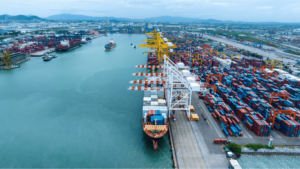In the quest for a greener planet, the focus often lands on the usual suspects: renewable energy sources such as solar and wind power, electric vehicles, and planting trees. However, one critical sector frequently escapes the spotlight yet holds a key to significantly reducing global carbon emissions – the maritime industry. As an integral part of the global economy, shipping accounts for about 90% of world trade and, according to the International Maritime Organization (IMO), emits nearly 3% of the world’s greenhouse gas emissions. This brings us to the crucial role of sustainable marine fuels, a frontier in the fight against climate change that promises a cleaner future for international shipping.
The Promise of Sustainable Marine Fuels
Sustainable marine fuels are seen as a beacon of hope in the maritime industry’s journey towards decarbonization. These fuels, ranging from biofuels and synthetic fuels to hydrogen and ammonia, offer the potential to significantly reduce the carbon footprint of shipping operations. Unlike conventional marine fuels, which are predominantly fossil-based, sustainable fuels emit lower levels of greenhouse gases throughout their lifecycle, from production to combustion.
Biofuels, for example, made from organic material, can be used in existing ship engines with minimal modifications, offering a relatively easy transition path. Synthetic fuels, such as e-methanol and e-diesel, produced using renewable energy sources, present a longer-term solution with the promise of carbon-neutral operations. Hydrogen and ammonia, although more challenging to handle due to their high energy requirements for production and issues related to storage and safety, represent a revolutionary step towards achieving zero-emission shipping.
Issues and Challenges
Transitioning to sustainable marine fuels is fraught with challenges. The primary issue is the current lack of infrastructure for production, distribution, and bunkering of these fuels at a global scale. Developing such an infrastructure requires significant investment and coordination among governments, industry stakeholders, and international bodies.
Another significant challenge is the higher cost of sustainable marine fuels compared to conventional fuels. This cost differential poses a considerable barrier to adoption, especially in a highly competitive industry where operating costs are a critical factor. Moreover, the variability in the availability of these fuels, depending on geographical location, further complicates their widespread adoption.
Technical challenges also abound. For instance, using hydrogen or ammonia as marine fuels requires significant modifications to ship engines and fuel storage systems, not to mention the need for stringent safety measures due to their highly flammable nature.
Historical Context and the Path Forward
The maritime industry’s journey towards sustainability is not a new endeavor. The IMO has been at the forefront, setting ambitious targets to reduce the industry’s carbon emissions. The most notable is the aim to reduce total annual GHG emissions by at least 50% by 2050 compared to 2008 levels. Achieving these targets necessitates a rapid and comprehensive shift to sustainable marine fuels.
Historically, the transition to cleaner fuels in the maritime sector has been slow, hampered by the issues outlined above. However, recent years have seen a notable shift in momentum, driven by technological advancements, regulatory pressures, and a growing recognition of the urgent need to combat climate change.
Collaboration across the industry and with governments is critical to overcoming the challenges facing sustainable marine fuels. This includes joint research initiatives, shared investments in fuel production and infrastructure development, and the implementation of supportive policies and incentives to bridge the cost gap between conventional and sustainable fuels.
One promising approach is the establishment of “green shipping corridors,” partnerships between ports to support the use of sustainable fuels through dedicated infrastructure and regulatory support. Such initiatives not only facilitate the transition to cleaner fuels but also demonstrate the feasibility and benefits of sustainable marine fuels on a smaller scale, laying the groundwork for broader adoption.
Conclusion
The promise of sustainable marine fuels is a cleaner, more sustainable future for the maritime industry and the planet. While the path to realizing this promise is fraught with challenges, the history of human innovation and cooperation gives us reason to be optimistic. By embracing sustainable marine fuels, the maritime industry can significantly reduce its environmental impact and take a bold step forward in the global fight against climate change.
As we navigate this sea change, the collective effort of all stakeholders—governments, industry, and society—is essential. With continued innovation, investment, and international collaboration, the vision of a sustainable maritime industry can become a reality, contributing to a healthier planet for future generations.
Lee Enterprises Consulting has over 180 experts that can help navigate your bioeconomy needs. If you need assistance with your sustainable marine fuel project, please Contact Us.

